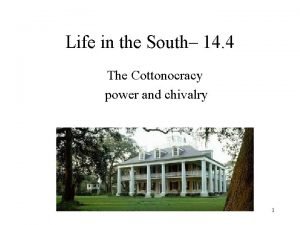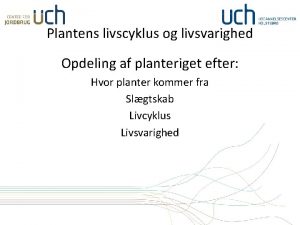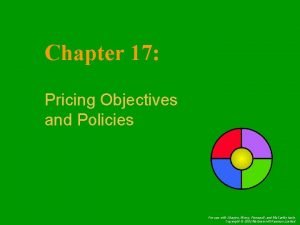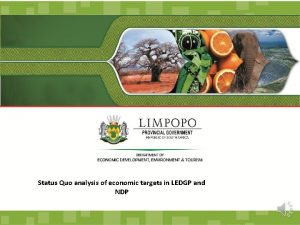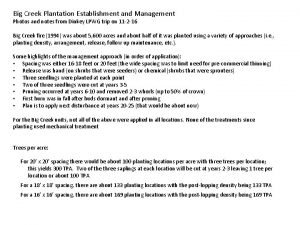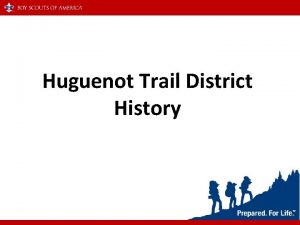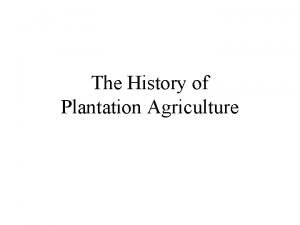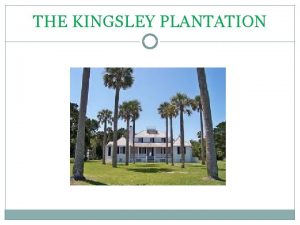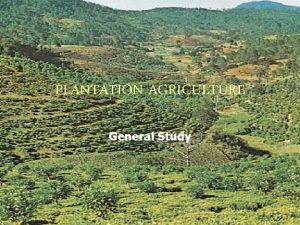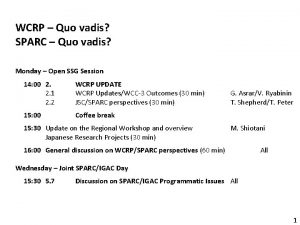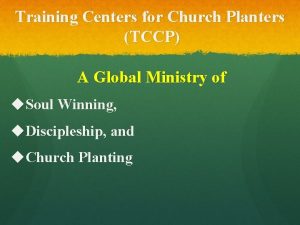Status quo of Plantation Planters were in control
















- Slides: 16

Status quo of Plantation �Planters were in control of the entire plantation, and also in control of the subservient free labor force with that control being economically, socially and politically manipulated. �Enslaved population were considered the chattel property of their masters, meaning that they had no voice or say in any of the decisions made.

Emancipation In the West Indies �British Territories- 1834 �French Territories-1848 �Spanish Territories- 1822, 1868

Territories Included �British Guiana �Trinidad �Jamaica �Cuba �Puerto Rico �Santa Domingo �Guadeloupe �Martinique �Barbados �St. Kitts �Antigua �St. Lucia

Problems that arose for Planters �Formerly enslaved population attempted different avenues of work. �Many sought peasantry. �Women, children and aged no longer compelled to work. �Quality of labor fell as the formerly enslaved chose to work at their convenience. �Increase in absenteeism. �Element of fear from punishment now lost. �Guaranteed of an available and reliable labor force now removed.

Planters Main Strategies �Restrict freedom of movement of formerly enslaved. �Reduce the alternatives of employment. �Keep formerly enslaved dependent of an artificial need for money.

Planter Strategies �Apprenticeship system- a system devised to ensure that the planters would receive a labor force for a few years after 1834 in the British West Indies. �Labor Laws/Contracts as early as 1848 in the French West Indies were instituted to control and manipulate the formerly enslaved. �In the Spanish West Indies The contratacion in 1823 and the Patronato system in 1868 were means of manipulation.

Planter Strategies �Attempted to recreate the slave system as much as possible. �Limited their free time. �Prevented emigration. �Taxation a key issue. �Increase police presence. �Strengthened vagrancy laws.

Planter Strategies �Vagrancy laws. �Limitations on free time. �Laws were passed making it difficult for laborers to leave the colony. �Increase on boats, canoes, carts and mules to prevent migration. �Tax increased from 50% to 200%. �Sugar and Sugar related amenities reduced to encourage sugar production.

Planter Strategies � Minimal qualification for voters manipulated. � Land increased out the range of a formerly enslaved. � Small plots or parts of land taxed very disproportionate. � Persons with lower incomes taxed more heavily than those with higher incomes. � A credit system was developed to keep laborers in debt. � Tied rent to wages. � Workers sometimes not paid due to deducted wages. � Rents were sometimes charged per head of household.

Formerly Enslaved expectations. � Newly freed wanted just and equitable wages. � Newly freed wanted consolidation of family units, i. e. to reform the family bonds of the past. � Newly freed wanted freedom of movement. � Newly freed wanted access to amenities such as provision grounds and burial grounds away from planter’s land. � Newly freed wanted flexible labor arrangements. � Wanted to plan allocation of time and labor between plantation work, their own provision grounds, the markets and other forms of employment.

Formerly Enslaved expectations. �Wanted to ensure that they would not be subject to exploitation and unfair conditions. �Sought out any opportunity to get cash and stay off the radar of the local forces. �Preferred to not work under contractual labor but rather task labor which was more flexible.

Formerly Enslaved Strategies. �Increase in provision grounds. �Many turned to economic subsistence. �Sale of provisions from provision grounds. �Acquire land independent cultivation. �Utilizing skills away from the plantation. �Steering of ships and building of crafts. �Many set up small businesses for peddling of goods. �Sought out properties in towns. �Purchasing of large, old, wooden houses in places away from whites.

Formerly Enslaved Strategies. �Renting of houses to newly freed persons who migrated to the towns. �Education was viewed as a vehicle of mobility for the next generation. �Collective purchasing of land by communities. �Churches played a pivotal role in establishing free villages and purchasing land. �Enhanced profitability by Family labor. �Reclaiming of African names. �Forming of social political pressure groups.

Formerly Enslaved Strategies. �Voted as a block to maximize the effect. �Worked for whomever they wanted. �Formed groups that were active in strikes, protests and riots. �Denied contractual labor. �Disregarded the law. �Disregarded curfews.

Counter strategies of the Planters �Restrictions on mobility. �Tenancy. �Depressed wages. �Limited opportunities on plantations due to mass immigration. �Severe pressure put on plantation grounds. �Justice system was still white manipulation. �Health care and social relief worse than during enslavement. �Immigrants. �Public amenities were horrible.

Conclusion �The Whites were very much under increased pressure to keep their sugar productions at a high due to the emancipation of the enslaved population. With that being said, it was evident that they opted many schemes in attempts to recreate the status quo of the pre emancipation era as much as possible. However, it must be noted that for every attempt they made to stifle the formerly enslaved, another idea emerged from the formerly enslaved in an attempt to keep their freedom.
 Cottonocracy
Cottonocracy Planters respiration
Planters respiration Millennium planters
Millennium planters Plantens livscyklus
Plantens livscyklus Status quo assessment
Status quo assessment Status quo pricing objective
Status quo pricing objective Sales oriented pricing objectives
Sales oriented pricing objectives Status quo
Status quo Status quo analysis
Status quo analysis Status quo genre
Status quo genre Status quo skimming
Status quo skimming Plymouth plantation summary
Plymouth plantation summary Fox creek plantation
Fox creek plantation Bank of americk
Bank of americk Phdt nuwara eliya
Phdt nuwara eliya Bellgrade plantation
Bellgrade plantation Pecan front gate
Pecan front gate
